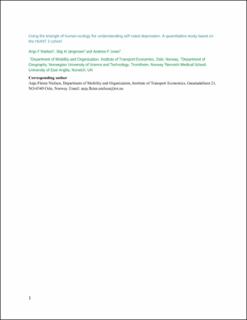Using the Triangle of Human Ecology for understanding self-rated depression: A quantitative study based on the HUNT 3 cohort
Peer reviewed, Journal article
Accepted version
Permanent lenke
https://hdl.handle.net/11250/3099890Utgivelsesdato
2023Metadata
Vis full innførselSamlinger
- Institutt for geografi [1108]
- Publikasjoner fra CRIStin - NTNU [38127]
Originalversjon
10.1177/14034948221122638Sammendrag
Aims: To test the Triangle of Human Ecology by examining associations between unipolar depression and different measures of human biological factors, health behaviour, and the physical environment. Methods: Data originate from the third wave of the Nord-Trøndelag Health Study (2006-2008). The survey was based on a random sample of 50,000 Norwegians (response rate: 54%). Logistic regression was performed, using unipolar depression, measured with the Hospital Anxiety and Depression Scale score, as outcome variable and 38 explanatory variables. Results: Biological factors including older age and male gender were associated with higher odds of depression, as were behavioural factors including drinking behaviour and having a neurotic personality. Reduced odds were associated with units of alcohol consumed, extrovert personality and physical activity. Social networks were an environmental factor with reduced odds at both personal and neighbourhood levels, as was warmer outdoor temperatures. Conclusions: Using the Triangle of Human Ecology provides a holistic insight into how behaviour, biology and the environment influence mental health. Using the Triangle of Human Ecology for understanding self-rated depression: A quantitative study based on the HUNT 3 cohort

